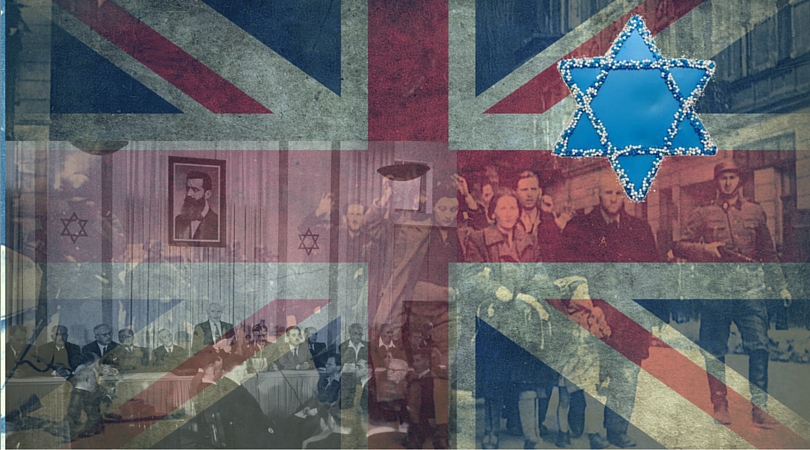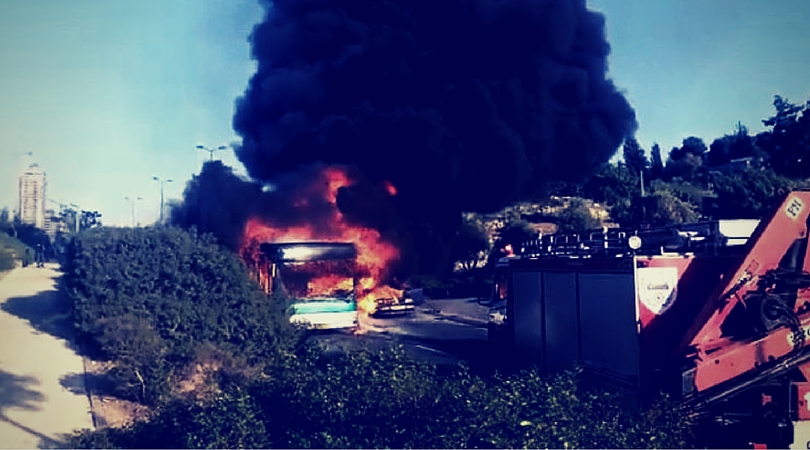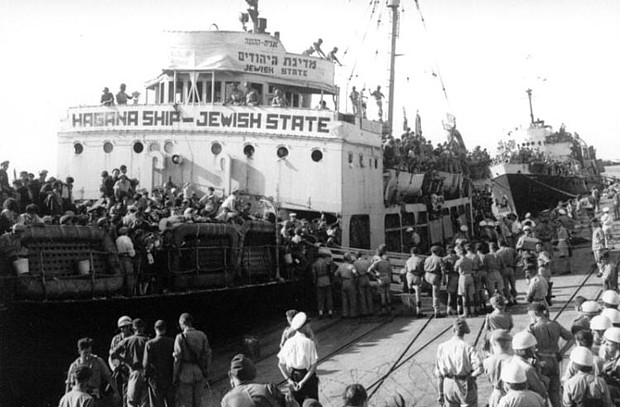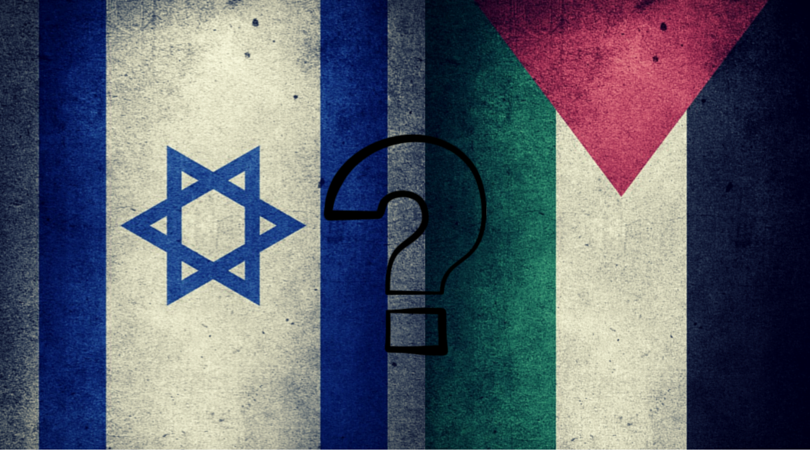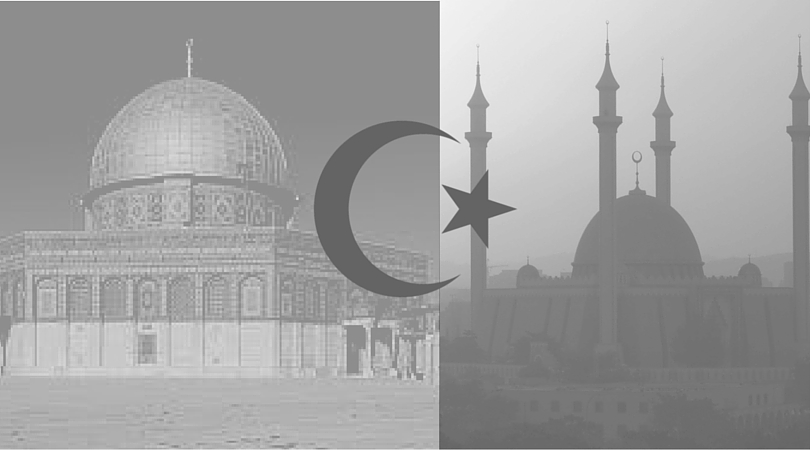On May 16th 1943, the Warsaw Ghetto lay in ruin. The uprising that lasted nearly a month was extinguished by German forces. 12,000 Jews who would not go quietly died ts the hands of their merciless enemies and yet, something about the uprising changed the energy in regards to the Jewish Nation.
For centuries Jews had gone willingly to their deaths. Exile in Europe and the Arabs lands had beaten down the Jewish soul, grinding it to become one of sheeplike submission. The Warsaw Ghetto Uprising gave a new message: “We are not your slaves. We will not go quietly.”
Whether or not the fighters in the ghetto knew it, their valiant effort to restore a certain amount of respect and humanity into the Jewish Nation injected a new spirit in their brothers and sisters fighting for freedom in Israel.
The Holocaust was designed to destroy the hope of the eternal nation. Hitler was not content at wiping out European Jews. He sought to destroy them everywhere, including Israel. The British fought Germany in WW2, but when it came to Israel the Nazis and Brits colluded in attempting to stamp out the fledgling Jewish community in the Land of Israel. The Nazis worked to destroy the Jews of Europe, the Brits ensured they could not get into Israel, and of course the Arab street in the Holy Land acted as their willing foot soldiers in their continued attempts to wipe out the Jewish presence in the land.
It is not clear that a Jewish State could have happened before 1948, but what is clear is that if the British had allowed open immigration, there would have never been a Holocaust.
The World has been nurtured on the myth of an Israel born from the Holocaust, but this myth has perpetuated the lie that the Jews are to be eternal victims. The State of Israel came about, because the Jews decided not to be victims anymore. The Jews of Europe, the Middle East, and North Africa decided that it was time to actualize the promise that the Creator had given to them. It is not clear that a Jewish State could have happened before 1948, but what is clear is that if the British had allowed open immigration, there would have never been a Holocaust.
Most people bring up the demographic challenge in Israel in regards to the Arabs that live West of the Jordan River, but the same Europe that challenges Israel on this issue is the Europe and especially Britain that is responsible for the demographic challenges. By colluding with Israel’s enemies, the British sought to do what they did in all of their colonies and that is underhandedly ensure that a violent population opposed to the legitimate indigenous people would in effect dictate the future of the colony.
The tool for this policy was the White Paper, seen below. The key sentences are bolded:
Section 1
“His Majesty’s Government believe that the framers of the Mandate in which the Balfour Declaration was embodied could not have intended that Palestine should be converted into a Jewish State against the will of the Arab population of the country. […] His Majesty’s Government therefore now declare unequivocally that it is not part of their policy that Palestine should become a Jewish State. They would indeed regard it as contrary to their obligations to the Arabs under the Mandate, as well as to the assurances which have been given to the Arab people in the past, that the Arab population of Palestine should be made the subjects of a Jewish State against their will.”
‘The objective of His Majesty’s Government is the establishment within 10 years of an independent Palestine State in such treaty relations with the United Kingdom as will provide satisfactorily for the commercial and strategic requirements of both countries in the future. [..] The independent State should be one in which Arabs and Jews share government in such a way as to ensure that the essential interests of each community are safeguarded.’
Section 2
‘His Majesty’s Government do not [..] find anything in the Mandate or in subsequent Statements of Policy to support the view that the establishment of a Jewish National Home in Palestine cannot be effected unless immigration is allowed to continue indefinitely. If immigration has an adverse effect on the economic position in the country, it should clearly be restricted; and equally, if it has a seriously damaging effect on the political position in the country, that is a factor that should not be ignored. Although it is not difficult to contend that the large number of Jewish immigrants who have been admitted so far have been absorbed economically, the fear of the Arabs that this influx will continue indefinitely until the Jewish population is in a position to dominate them has produced consequences which are extremely grave for Jews and Arabs alike and for the peace and prosperity of Palestine. The lamentable disturbances of the past three years are only the latest and most sustained manifestation of this intense Arab apprehension […] it cannot be denied that fear of indefinite Jewish immigration is widespread amongst the Arab population and that this fear has made possible disturbances which have given a serious setback to economic progress, depleted the Palestine exchequer, rendered life and property insecure, and produced a bitterness between the Arab and Jewish populations which is deplorable between citizens of the same country. If in these circumstances immigration is continued up to the economic absorptive capacity of the country, regardless of all other considerations, a fatal enmity between the two peoples will be perpetuated, and the situation in Palestine may become a permanent source of friction amongst all peoples in the Near and Middle East.’
“Jewish immigration during the next five years will be at a rate which, if economic absorptive capacity permits, will bring the Jewish population up to approximately one third of the total population of the country. Taking into account the expected natural increase of the Arab and Jewish populations, and the number of illegal Jewish immigrants now in the country, this would allow of the admission, as from the beginning of April this year, of some 75,000 immigrants over the next four years. These immigrants would, subject to the criterion of economic absorptive capacity, be admitted as follows: For each of the next five years a quota of 10,000 Jewish immigrants will be allowed on the understanding that a shortage one year may be added to the quotas for subsequent years, within the five-year period, if economic absorptive capacity permits. In addition, as a contribution towards the solution of the Jewish refugee problem, 25,000 refugees will be admitted as soon as the High Commissioner is satisfied that adequate provision for their maintenance is ensured, special consideration being given to refugee children and dependents. The existing machinery for ascertaining economic absorptive capacity will be retained, and the High Commissioner will have the ultimate responsibility for deciding the limits of economic capacity. Before each periodic decision is taken, Jewish and Arab representatives will be consulted. After the period of five years, no further Jewish immigration will be permitted unless the Arabs of Palestine are prepared to acquiesce in it.”
Section 3
“The Reports of several expert Commissions have indicated that, owing to the natural growth of the Arab population and the steady sale in recent years of Arab land to Jews, there is now in certain areas no room for further transfers of Arab land, whilst in some other areas such transfers of land must be restricted if Arab cultivators are to maintain their existing standard of life and a considerable landless Arab population is not soon to be created. In these circumstances, the High Commissioner will be given general powers to prohibit and regulate transfers of land.‘
The Revolt and Never Again
The White Paper was built to create a Jewish dependent within the Land of Israel. The British knew the Jews had no hope of surviving under a majority Arab rule, which they created by allowing open Arab immigration while restricting Jewish immigration.
Each section can be summed up in the following way: “We British have no interest in a sovereign Jewish State and will ensure this by preventing Jews from moving to their ancestral homeland and restricting land sales to Jews.”
The White Paper was the British way of creating another Warsaw Ghetto The Jews of Israel began a Revolt in February of 1944, less than a year after their brothers and sisters in Europe rose up to fight instead of being gassed like passive sheep.
The revolt led by the Irgun of Menachem Begin and the Lehi of Shamir, Eldad, and Mor succeeded in taking the spirit of the Warsaw Ghetto Uprising to the front lines of the war for Hebrew freedom in the Land of Israel. This war lasted until the the British left, licking their wounds on what is now Israel Independence Day.
Holocaust Remembrance Day is more than remembering the fallen Jews of the Holocaust, it is about understanding that it is up to us to ensure a prevention of profaning the name of G-d, which occurs when his children are wantonly destroyed. We may lose or win, but the fight is necessary to preserve the name of the Creator in the World. Blessings are eternal, but they can only be actualized by action.
Driving the British out and defeating five British trained Arab armies from destroying the Jewish state, restored the Name of G-d to its rightful place. The action which began this reversal was the Warsaw Ghetto Uprising.
Never Again, does not mean we always win. It means from now on the Jewish Nation will not allow the name of G-d to be tarnished by our passivity. Never Again!

